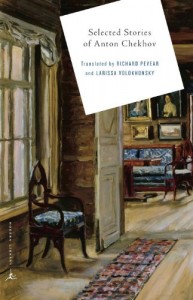 Literature’s second great tubercular doctor-turned-writer, Anton Chekhov, has much in common with my beloved John Keats, beyond these superficial coincidences. Chekhov’s art, though stylistically much different from Keats’, nonetheless bears a certain thematic relation. Keats championed what he called “Negative Capability,” the ability of a poet to dwell in uncertainties, without any “irritable reaching” after fact or resolution. Compare that with the following famous pronouncement Chekhov made in a letter to a friend:
Literature’s second great tubercular doctor-turned-writer, Anton Chekhov, has much in common with my beloved John Keats, beyond these superficial coincidences. Chekhov’s art, though stylistically much different from Keats’, nonetheless bears a certain thematic relation. Keats championed what he called “Negative Capability,” the ability of a poet to dwell in uncertainties, without any “irritable reaching” after fact or resolution. Compare that with the following famous pronouncement Chekhov made in a letter to a friend:
The artist must pass judgment only on what he understands; his range is as limited as that of any other specialist – that’s what I keep repeating and insisting upon. Anyone who says the artist’s field is all answers and no questions has never done any writing or had any dealings with imagery. The artist observes, selects, guesses and synthesizes… You are right to remand that an author take conscious stock of what he is doing, but you are confusing two concepts: answering the questions and formulating them correctly. Only the latter is required of an author.
Much of what makes Chekhov original (and difficult) comes from this refusal to provide easy answers. His stories rarely have a clearly defined beginning, middle and end. In fact, he seems to delight in abrupt or surprising or unsatisfactory endings. Moreover, there is no easily discernible moral message. The good often suffer while the wicked prosper.
The greatest sin in Chekhov’s fiction is self-delusion. Husbands allow themselves to be deceived by their wives; women take the wrong lovers; parents see only idealized versions of their children. And for this stupidity Chekhov makes them suffer. Here is the Russian philosopher Lev Shestov on this propensity in Chekhov:
Idealism of every kind, whether open or concealed, roused feelings of intolerable bitterness in Chekhov. He found it more pleasant to listen to the merciless menaces of a downright materialist than to accept the dry-as-dust consolations of humanizing idealism. An invincible power is in the world, crushing and crippling man – this is clear and even palpable. The least indiscretion, and the mightiest and the most insignificant alike fall victims to it. One can only deceive oneself about it as long as one knows of it only by hearsay. But the man who has once been in the iron claws of necessity loses forever his taste for idealistic self-delusion.
I quarrel only with the sentiment of bitterness Shestov senses. If Chekhov is embittered by our foolishness, he also understands it and takes great pity on us for our blind idealism. In “At Christmastime,” for example, an aging mother, an illiterate peasant, goes to great lengths to mail a letter to her daughter, who has married a wealthy man in a far away city and seemingly cut all ties with her. Chekhov gives us this:
The old woman did not sleep all night, troubled by thoughts, but she got up at dawn, said her prayers, and went to the station to mail the letter.
The station was seven miles away.
So concludes the chapter, and our last contact with the old woman. Why must the station be seven miles away? Implicit in that sentence is the image of the sleepless old peasant slowly making her way, on foot, to the post station. It seems almost cruel of Chekhov to subject his character to that long march, but I contend that it is only by the very act of making her suffer that we can get the full measure of her love for her child.
To return to Shestov’s insight about the iron claws of necessity puncturing forever our idealistic lies — this also serves as an apt description of what it’s like to read Chekhov. He punctures illusions, confronts us in our most cherished delusions.
This is not a comfortable process, but comfort is greatly overrated. Growth demands discomfort.